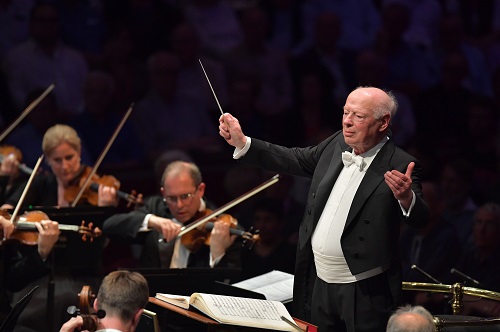
 United Kingdom Prom 18 – Mahler: Sarah Connolly (mezzo-soprano), Tiffin Boys’ Choir, London Symphony Chorus (women’s voices), London Symphony Orchestra / Bernard Haitink. Royal Albert Hall, London, 29.7.2016. (CC)
United Kingdom Prom 18 – Mahler: Sarah Connolly (mezzo-soprano), Tiffin Boys’ Choir, London Symphony Chorus (women’s voices), London Symphony Orchestra / Bernard Haitink. Royal Albert Hall, London, 29.7.2016. (CC)

(c) Chris Christodoulou
Mahler – Symphony No.3 in D minor
It is a massive understatement to say that Bernard Haitink, 87 years young, needs no introduction to the Proms. His debut here was in 1966 (Bruckner Seventh). He has always been associated with Mahler and Bruckner (his Philips Concertgebouw Das Lied von der Erde with Janet Baker and James King remains an astonishing achievement), and just in terms of Mahler’s Third Symphony alone, he has significant history. He has conducted it previously at the Albert Hall in 1971, 1981 and 1999. Mahler symphonies do rather seem the perfect repertoire for the Albert Hall’s huge space – not just in heft, but in the use of gesture, particularly off-stage instruments (side-drum and posthorn – or rather, flugelhorn here). The hall was packed, as one might expect. (The later David Bowie Prom was presumably just as popular, making one hope for a spectacularly successful night for the Proms management).
The Third Symphony is a huge canvas, a great paean to Nature. Haitink is no Bernstein: it is against his nature to stop and look at every passing buttercup (or stop to wave at each passing marching band, for that matter). The grand plan is always at the back of his mind, the destination implicit from the off; the unison horn opening, massively confident, was nothing if not brisk, the tread firm and determined. Watching Haitink, what was striking was the economy of gesture; nothing wasted, everything to the point. Horns worked as one unit; the brass, too, played beautifully, not least the beautifully judged, strong solo from LSO principal trombonist Dudley Bright. Another vital aspect of Haitink’s reading was the underscoring of the forward-looking nature of Mahler’s writing: no one has reminded me more of an article I read many years ago as part of postgraduate study by Robert P. Morgan: Ives and Mahler: Mutual Responses at the end of an era (in 19th-Century Music, 2/1, 1978). The orchestral sound itself was wonderfully projected, with antiphonal violins, cellos in front of the conductor and double-basses at the back to his left.
The second movement (originally, “What the flowers of the meadow tell me”) was preternaturally gentle at its outset, sprightly later, Mahler’s scoring magically caught. It did bring up one element of Haitink’s reading that detracted from the full Mahler picture, though, in that grotesqueries were rather underplayed. Sarah Connolly, who had only a couple of days earlier sung Fricka in Die Walküre at Bayreuth under Marek Janowski, entered at this point, sitting stock still for the characterful third movement. Trumpets and clarinet seemed particularly attuned to Mahler’s world, while the off-stage “posthorn” flugelhornist Nicolas Betts, was nothing short of miraculous, his top notes crystal clear, every one hit bang in the middle. (Admittedly towards the very end of his contributions to the symphony there was the impression of the lip tiring).
The near-inaudibility of the lower strings at the start of the fourth movement, coupled with their control created the perfect backdrop for Connolly’s perfectly judged, plangent delivery of Mahler’s Nietzsche setting. Haitink underlined Mahler’s nightmarish scoring, while leader Carmine Lauri’s solo violin contributions were excellently judged. The performance created the perfect atmosphere. The sudden shift to the bright-toned angelic song of the fifth movement was like stepping into sunlight: here the Tiffin Boys’ Choir was on top form and the Women of the London Symphony Chorus exhibited perfect diction.
The expansive finale (“Langsam. Ruhevoll. Empfunden”) was simply superb, hushed yet with momentum and blessed with a gorgeously warm string sound. The unfolding was very natural, brass-encrusted climaxes resonating deeply and a solo flute and clarinet offering real hope and consolation. True, some have plumbed yet deeper, but Haitink’s reading will surely remain a true highlight of the 2016 Proms.
Colin Clarke
